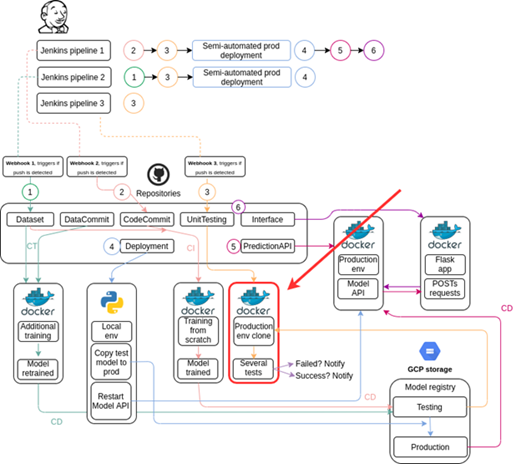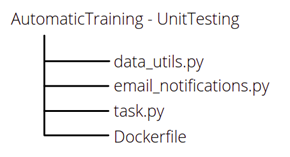catalogue
In this series of articles, we will guide you through CI/CD be applied to AI The process of the task. You will eventually get a satisfaction Google MLOps maturity model Functional piping required by level 2. We assume that you are right Python,Deep learning,Docker,DevOps and Flask Have a certain understanding.
In this series Previous articles In, we explained how to continuously integrate model changes and continuously train our model when new data is collected. In this article, we will test the trained model in an environment that simulates a production environment. We will load the model saved in the test registry, expose it through the cloning of the model API, and run tests against it. You are welcome to add your own tests at this stage. The following figure shows our position during the project.

The code file structure is as follows:

From its repository Get the original code.
data_utils.py
This data_ utils. The function contained in the PY file is to check whether there is a model in the test model registry. If so, load the model:
import datetime
from google.cloud import storage
import pandas as pd
import numpy as np
import os
import cv2
import sys
def previous_model(bucket_name,model_filename):
try:
storage_client = storage.Client() #if running on GCP
bucket = storage_client.bucket(bucket_name)
status = storage.Blob(bucket=bucket, name='{}/{}'.format('testing',model_filename)).exists(storage_client)
return status,None
except Exception as e:
print('Something went wrong when trying to check if previous model exists GCS bucket. Exception: '+e,flush=True)
return None,e
def load_model(bucket_name,model_filename):
try:
storage_client = storage.Client() #if running on GCP
bucket = storage_client.bucket(bucket_name)
blob1 = bucket.blob('{}/{}'.format('testing',model_filename))
blob1.download_to_filename('/root/'+str(model_filename))
return True,None
except Exception as e:
print('Something went wrong when trying to load previous model from GCS bucket. Exception: '+e,flush=True)
return False,eemail_notifications.py
This email_notifications.py file handle to notify the product owner of successful or problematic code execution:
import smtplib
import os
# Email variables definition
sender = 'example@gmail.com'
receiver = ['svirahonda@gmail.com'] #replace this by the owner's email address
smtp_provider = 'smtp.gmail.com' #replace this by your STMP provider
smtp_port = 587
smtp_account = 'example@gmail.com'
smtp_password = 'your_password'
def send_update(message):
message = 'Subject: {}\n\n{}'.format('An automatic unit testing has ended recently.', message)
try:
server = smtplib.SMTP(smtp_provider,smtp_port)
server.starttls()
server.login(smtp_account,smtp_password)
server.sendmail(sender, receiver, message)
return
except Exception as e:
print('Something went wrong. Unable to send email.',flush=True)
print('Exception: ',e)
return
def exception(e_message):
try:
message = 'Subject: {}\n\n{}'.format('Something went wrong with the testing API.', e_message)
server = smtplib.SMTP(smtp_provider,smtp_port)
server.starttls()
server.login(smtp_account,smtp_password)
server.sendmail(sender, receiver, message)
return
except Exception as e:
print('Something went wrong. Unable to send email.',flush=True)
print('Exception: ',e)
returntask.py
This task Py file processing container execution. It coordinates the initialization and termination of the flash application, model loading, model testing, and email notification:
import tensorflow as tf
from tensorflow.keras.models import load_model
import jsonpickle
import data_utils, email_notifications
import sys
import os
from google.cloud import storage
import datetime
import numpy as np
import jsonpickle
import cv2
from flask import flash,Flask,Response,request,jsonify
import threading
import requests
import time
# IMPORTANT
# If you're running this container locally and you want to access the API via local browser, use http://172.17.0.2:5000/
# Starting flask app
app = Flask(__name__)
# general variables declaration
model_name = 'best_model.hdf5'
bucket_name = 'automatictrainingcicd-aiplatform'
class_names = ['Normal','Viral Pneumonia','COVID-19']
headers = {'content-type': 'image/png'}
api = 'http://127.0.0.1:5000/' # self app
global model
@app.before_first_request
def before_first_request():
def initialize_job():
if len(tf.config.experimental.list_physical_devices('GPU')) > 0:
tf.config.set_soft_device_placement(True)
tf.debugging.set_log_device_placement(True)
global model
# Checking if there's any model saved at testing on GCS
model_gcs = data_utils.previous_model(bucket_name,model_name)
# If any model exists at testing, load it, test it on data and use it on the API
if model_gcs[0] == True:
model_gcs = data_utils.load_model(bucket_name,model_name)
if model_gcs[0] == True:
try:
model = load_model(model_name)
except Exception as e:
email_notifications.exception('Something went wrong trying to test old /testing model. Exception: '+str(e))
sys.exit(1)
else:
email_notifications.exception('Something went wrong when trying to load old /testing model. Exception: '+str(model_gcs[1]))
sys.exit(1)
if model_gcs[0] == False:
email_notifications.send_update('There are no artifacts at model registry. Check GCP for more information.')
sys.exit(1)
if model_gcs[0] == None:
email_notifications.exception('Something went wrong when trying to check if old testing model exists. Exception: '+model_gcs[1]+'. Aborting automatic testing.')
sys.exit(1)
api_test()
thread = threading.Thread(target=initialize_job)
thread.start()
@app.route('/init', methods=['GET','POST'])
def init():
message = {'message': 'API initialized.'}
response = jsonpickle.encode(message)
return Response(response=response, status=200, mimetype="application/json")
@app.route('/', methods=['POST'])
def index():
if request.method=='POST':
try:
#Converting string that contains image to uint8
image = np.fromstring(request.data,np.uint8)
image = image.reshape((128,128,3))
image = [image]
image = np.array(image)
image = image.astype(np.float16)
result = model.predict(image)
result = np.argmax(result)
message = {'message': '{}'.format(str(result))}
json_response = jsonify(message)
return json_response
except Exception as e:
message = {'message': 'Error: '+str(e)}
json_response = jsonify(message)
email_notifications.exception('Something went wrong when trying to make prediction via testing API. Exception: '+str(e)+'. Aborting automatic testing.')
return json_response
else:
message = {'message': 'Error. Please use this API in a proper manner.'}
json_response = jsonify(message)
return json_response
def self_initialize():
def initialization():
global started
started = False
while started == False:
try:
server_response = requests.get('http://127.0.0.1:5000/init')
if server_response.status_code == 200:
started = True
except:
pass
time.sleep(3)
thread = threading.Thread(target=initialization)
thread.start()
def api_test():
try:
image = cv2.imread('TEST_IMAGE.jpg')
image = cv2.cvtColor(image, cv2.COLOR_BGR2RGB)
image = cv2.resize(image, (128, 128))
result = requests.post(api, data=image.tostring(),headers=headers)
result = result.json()
prediction = int(result['message'])
if prediction == 1:
email_notifications.send_update('Testing stage has ended successfully. Shutting down container. Check the GCP logs for more information.')
sys.exit(0)
else:
email_notifications.send_update('Testing stage has crashed. Check the GCP logs for more information.')
sys.exit(1)
except Exception as e:
email_notifications.exception('Testing stage crashed with an exception: '+str(e)+'. Check the GCP logs for more information.')
sys.exit(1)
if __name__ == '__main__':
self_initialize()
app.run(host='0.0.0.0',debug=True,threaded=True)Dockerfile
Our Dockerfile provides rules for building containers:
FROM gcr.io/deeplearning-platform-release/tf2-cpu.2-0 WORKDIR /root RUN pip install pandas numpy google-cloud-storage scikit-learn opencv-python Flask jsonpickle RUN apt-get update; apt-get install git -y; apt-get install -y libgl1-mesa-dev ADD "https://www.random.org/cgi-bin/randbyte?nbytes=10&format=h" skipcache RUN git clone https://github.com/sergiovirahonda/AutomaticTraining-UnitTesting.git RUN mv /root/AutomaticTraining-UnitTesting/data_utils.py /root RUN mv /root/AutomaticTraining-UnitTesting/task.py /root RUN mv /root/AutomaticTraining-UnitTesting/email_notifications.py /root RUN mv /root/AutomaticTraining-UnitTesting/TEST_IMAGE.jpg /root EXPOSE 5000 ENTRYPOINT ["python","task.py"]
After you build and run the container locally, you will get a functional model unit tester. It allows you to verify that the model to be deployed to production outputs the expected results without errors or failures.
Feel free to include additional tests in this job. Typically, such testing depends on the business case.
next step
stay Next article In, we will build an API that will load our model from the production registry to enable In Google MLOps maturity model Describes the forecast service. Please pay attention!
https://www.codeproject.com/Articles/5301649/MLOps-Continuous-Delivery-with-Model-Unit-Testing